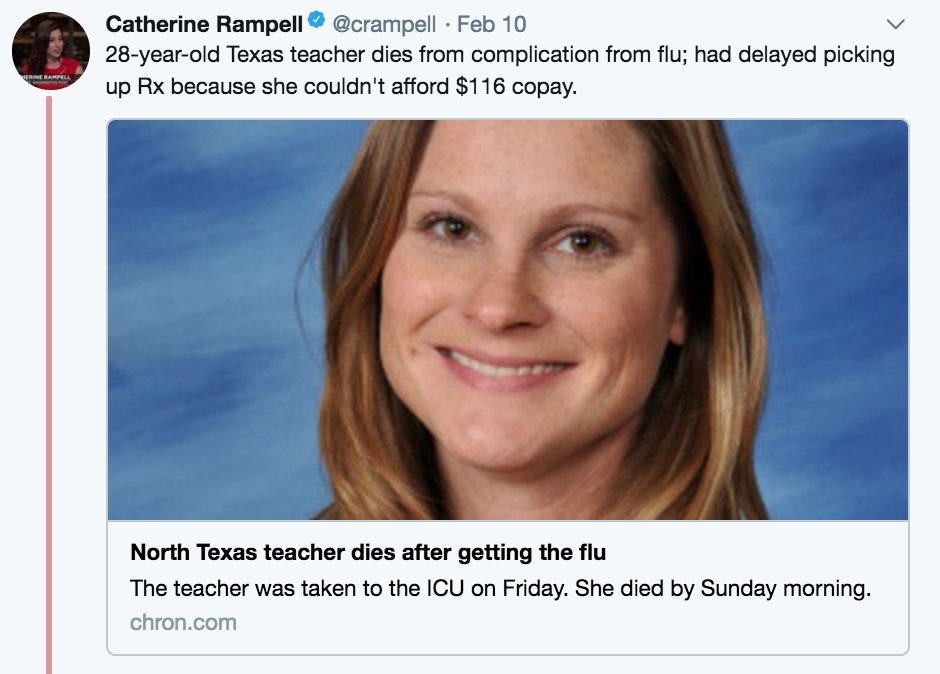Did you hear the story this weekend about the teacher in Texas who tragically died from the flu because she couldn't afford to pay for her prescribed medication? I certainly did, multiple times from multiple sources, across both Twitter and Facebook.
This tweet from the Washington Post's Catherine Rampell received over 10,000 retweets alone: "28-year-old Texas teacher dies from complication from flu; had delayed picking up RX because she couldn't afford $116 copay."

It was one of those headlines and pictures that was hard to ignore — the premise of a young, healthy-looking teacher needlessly losing her life to a highly curable illness, simply because of the cost of her prescription. Beyond the personal tragedy and national concerns over the severity of this year's flu season, there was a clear social narrative: No American should have to die — especially from a common ailment — due to unaffordable healthcare.
Reasonable people would agree with that statement, and perhaps even feel inclined to identify this terrible incident as a societal failure.
Politically, both sides were handed a theme to run with. For the Left, the greed of the pharmaceutical industry and a lack of price-control regulations were to blame. For the Right, Obamacare (and its failure to make healthcare affordable) was the culprit. The story spread quickly across social media because it granted people a real-world, relatable example through which to air their political grievances.
Only, as it turns out, there was an important fact that was omitted in the viral sharing of this story — a fact that the Wall Street Journal did include in their reporting: The teacher, Heather Holland, could afford the medication she was prescribed, but delayed picking it up because she was "a very frugal person in general" and "always has been." This was according to Holland's husband, who described her frugality as principled.
Additionally, Holland wasn't as young as people were told. She was actually 38, not 28.
Neither of these revelations make the Holland story any less tragic. She was a wife and mother of two young children, and her untimely passing should be met with sympathy, prayers, and good wishes for her family. The problem here is the inclination of people to put narratives ahead of facts, in order to bolster a previously held belief.
According to Rampell (who retracted her tweet two days later, citing the Wall Street Journal piece), the news source she originally referenced (The Houston Chronicle) had reported Holland's age as 28, and later corrected it. I'm inclined to believe her, though there is no editor's note describing the correction on the Houston Chronicle's website.
The false assumption (presented as a fact) that Holland couldn't afford her prescribed medication seems to have stemmed from a piece in the Weatherford Democrat that describes Holland's husband, Frank Holland, as saying that his wife "felt the $116 copay was too high."
Of course, there's a big difference between thinking something is too expensive and not being able to afford it.
Rampell has issued two retraction tweets to the original tweet (which again, was retweeted several thousand times). The combined number of retweets for those two retractions (as of the time I'm writing this): Just 35.
Sadly, this type of thing isn't all that rare in the viral information age we live in. False information spreads like wildfire, and subsequent corrections get almost no exposure at all. Unfortunately, the truth is often much less interesting and much less useful than a good bias-fueled political narrative.
Heck, I have friends on Facebook who are, as of this morning, still spreading the false information about Heather Holland, and they seem to think I'm a jerk for pointing out that their facts are wrong. Because even if it's not true for Holland, a similar situation is assuredly true for someone else who's sick and can't afford to get well. At least that's the thought process.
"If it makes sense to you, if it strikes a chord, if it rings true, it is true.” Michael Wolfe made this statement last month in support of his controversial book on the Trump White House, Fire and Fury.
Though Wolfe has been widely discredited over false information in his book (which has sold nearly 2 million copies), along with his unfounded claim that President Trump and Nikki Haley had an affair, I'd say that he clearly has a pulse for what resonates in this country: If it rings true, it is true.
And that's a shame.




